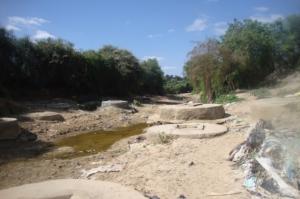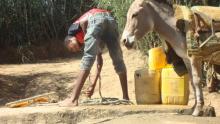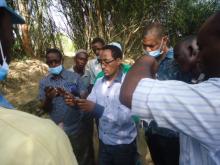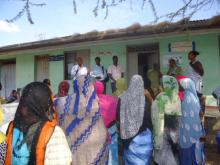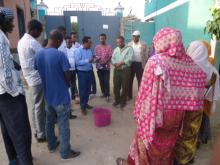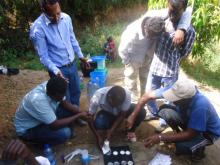Ethiopia - Response for Acute Watery Diarrhea outbreak in Moyale town
Moyale town and surrounding kebeles (a kebele is the smallest unit of local government and can best be regarded as a municipality, a neighbourhood, a localized and delimited group of people or ward) have been affected with Acute Watery Diarrhea (AWD) since 7 November, 2015. The Town is the capital of both Moyale-Oromia and Moyale-Somali Woredas (or districts) and they share a border with Kenya. The town has very high population traffic from different regions, without any restriction to movement.
Since the start of the AWD outbreak, a total of 268 cases and two deaths have been reported as of February first 2016. According to the 2008 Ethiopian Fiscal Year woreda plan, the population of the two Moyale woredas is 500,565.
As the town is a hub for laborers and traders from Oromia and Somali regions, it is one of the largest regions in Ethiopia in terms of population and geographical size. Therefore, an outbreak in this town will be of a greater health risk to the country, as a whole, and also to Kenya.
Consequently, WHO classified Moyale as a high priority hotspot and deployed its team comprised of a communication consultant and a Public health and Environment national officer to Moyale town on Dec 26, 2015. The team conducted a rapid assessment to identify gaps and to strengthen the outbreak response. Recommendations were made on the, appropriate actions to take in order to intensify comprehensive response interventions and prevent and control the spread of the outbreak.
The WHO-supported response plan, which has been implemented by woreda and zonal administrators, is organized into seven pillars, namely, coordination team, surveillance, case management, social mobilization, regulatory, logistics and WASH (WASH interventions were intensified at the beginning of the outbreak).
The major gaps identified by the team included cross woreda and cross boarder coordination, community engagement, as well as limited resources (human, financial) and logistical gaps. High risk of contamination of water sources, open defecation, indiscriminate solid and liquid waste disposal, limited availability of latrines, Influx of migrant workers and absence of appropriate House Hold Water Treatment Chemicals are also among the gaps identified during the assessment.
A WHO team provided technical support and guidance for the revision of the response intensification plan and its implementation, together with the woredas, Borena zone health office, Regional Health Bureaus, the Federal Ministry of Health and UNICEF. The aim is to sustain the commendable work that have been carried out since the onset of the outbreak. The revised plan has been distributed to all stakeholders.
The woreda coordination of key sectoral offices such as Water, Education, Trade , urban planning, is observed to have less involvement Re-activate and sustain a strong multi-sectoral partnership, cross woreda and cross boarder coordination activities , establish a command post, effective distribution of appropriate household water treatment chemicals, safe storage and handling of water at house hold level, provision of adequate water rationing and regular water quality monitoring, uninterrupted detail case investigation, and provide water supply to the rural pastoralist community were the recommendation forwarded to stop the outbreak.
Various technical teams in both Moyale woredas monitor the case management center, conduct and guide surveillance activities, oversee WASH interventions, advice and guide stakeholders to promote social mobilization and awareness creation on the safe handling and storage of water at the household level and re-activate coordination activities.
A total of 923 households with 4,508 persons were sensitized to AWD prevention and control activities, during a campaign conducted between January 21 and 26.
Comprehensive house-to-house assessment forms have been developed and orientation sessions for health workers and health extension workers have taken place. House-to-house active case detection, distribution of water treatment chemicals, and house-to-house assessments on community awareness of AWD prevention and control have been carried out, with the participation of woreda health offices, health workers and health extension workers, zonal health offices, regional health bureaus and the Federal Ministry of Health and WHO teams.



